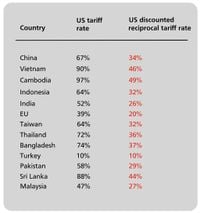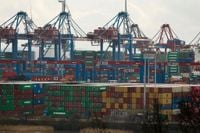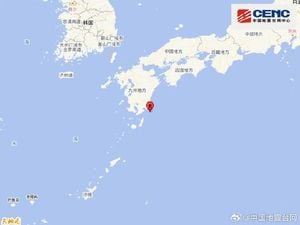The United States has announced a series of reciprocal tariffs targeting apparel-producing countries, a move that could significantly affect trade relations and the global fashion industry. Effective immediately on April 2, 2025, countries such as China, Cambodia, Bangladesh, Vietnam, Malaysia, and India will face steep charges on their exports to the U.S. This decision, announced by the Trump Administration, has sparked widespread concern among American fashion brands and retailers, who rely heavily on global supply chains.
According to the United States Fashion Industry Association (USFIA), the newly imposed tariffs will particularly impact American fashion brands and retailers. The association expressed its disappointment shortly after the tariffs were imposed, stating, “We are deeply disappointed by the Trump Administration’s decision to impose new tariffs on all imports. This action will particularly affect American fashion brands and retailers.” The USFIA emphasized that the fashion industry is uniquely dependent on international supply chains, noting, “For instance, a bale of cotton might be grown in Texas, shipped to Europe to be spun into yarn, sent to Korea for fabric production, then to Vietnam for garment assembly, and finally to the U.S. for retail sale – back in Texas.”
The tariffs come at a time when the fashion industry is already facing challenges due to high import rates. In 2024, the average tariff on apparel was reported at 14.6%, significantly higher than the 5% average tariff on steel. The USFIA argues that while tariffs can be a useful tool in addressing unfair trade practices, they disproportionately impact the fashion sector, which is already burdened by high costs.
In a related development, a report published by the research institute ifo on April 1, 2025, indicated that if the U.S. were to impose reciprocal tariffs on German products, exports to the U.S. would likely fall by 3% at worst. The report suggested that retaliatory measures by the European Union could cause more economic damage than doing nothing. This finding comes as the EU considers its response to the fresh tariffs announced by President Trump.
The study modeled various scenarios, revealing that German exports to the U.S. would decrease by 2.4% if the U.S. increased tariffs to match those imposed on U.S. products. If the EU were to retaliate, the total decrease in German exports could reach 3%. The authors of the report warned of the detrimental effects of tariff escalations, emphasizing that the overall tariff gap between the U.S. and the EU is relatively narrow at 0.5%. Previous research indicated that under a scenario of flat 20% tariffs on imports from all trade partners and 60% on Chinese products, German exports could fall by as much as 15%.
Furthermore, economic research from DIW Berlin published on April 2, 2025, projected that blanket U.S. tariffs of 25% would lead to a GDP decline of 0.25% in the EU and 0.33% in Germany. The findings underscore the potential economic fallout from escalating trade tensions and the need for careful consideration of retaliatory measures.
Meanwhile, South Korea is also feeling the impact of the U.S. tariffs. The United States plans to impose 25% reciprocal tariffs on a wide range of South Korean imports starting around April 7, 2025. However, key sectors such as automobiles, semiconductors, and steel products have been spared from these measures. Despite the exemptions, industry observers caution that these sectors may still face significant challenges due to existing tariffs or anticipated sector-specific tariffs under Trump's "America First" trade policy.
In 2024, South Korea's exports to the U.S. totaled $127.8 billion, marking a 10.4% increase from the previous year, with automobile exports accounting for $34.7 billion, or 27.2% of the total. Exports of semiconductors and memory chips reached $8.2 billion, while steel exports were valued at $2.9 billion. Together, these three sectors represented approximately 36% of South Korea's total exports to the U.S.
While the exemptions may provide temporary relief for South Korea's top export categories, the newly imposed reciprocal tariffs are expected to affect a variety of other industrial and consumer goods. According to the Korea International Trade Association (KITA), affected items could include batteries and petroleum products, which accounted for $3.9 billion and $5.1 billion in U.S.-bound exports, respectively.
In light of these developments, the Ministry of Trade, Industry and Energy in South Korea was scheduled to hold a meeting with industry representatives on April 3, 2025, to assess the scope of the impact and explore potential response measures. The meeting underscores the urgency of addressing the challenges posed by the new tariffs and finding ways to mitigate their effects on South Korean businesses.
As the U.S. continues to implement these tariffs, the global trade landscape is likely to shift, with countries reassessing their strategies and responses to the evolving economic environment. The implications of these tariffs could reverberate across various industries, affecting not only the countries directly targeted but also the broader international market.
In conclusion, the newly announced reciprocal tariffs by the U.S. on apparel-producing countries and other imports highlight the complexities of global trade relations. As countries grapple with the potential economic fallout, the focus will likely shift to finding solutions that balance trade interests and economic stability in an increasingly interconnected world.






